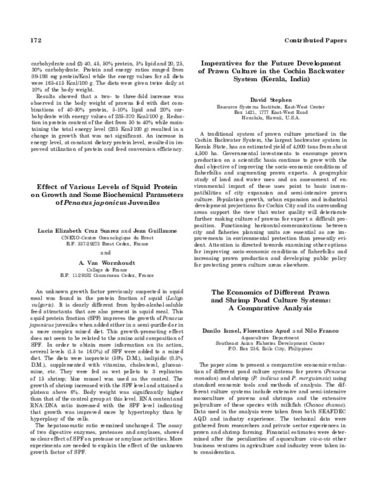Effect of various levels of squid protein on growth and some biochemical parameters of Penaeus japonicus juveniles
Share
Abstract
An unknown growth factor previously suspected in squid meal was found in the protein fraction of squid (Loligo vulgaris). It is clearly different from hydro-alcohol-soluble feed attractants that are also present in squid meal. This squid protein fraction (SPF) improves the growth of Penaeus japonicus juveniles when added either in a semi-purified or in a more complex mixed diet. This growth-promoting effect does not seem to be related to the amino acid composition of SPF. In order to obtain more information on its action, several levels (1.5 to 16.0%) of SPF were added to a mixed diet. The diets were isoproteic (59% D.M.), isolipidic (8.5% D.M.), supplemented with vitamins, cholesterol, glucosamine, etc. They were fed as wet pellets to 3 replicates of 15 shrimp; blue mussel was used as the control. The growth of shrimp increased with the SPF level and attained a plateau above 6%. Body weight was significantly higher than that of the control group at this level. RNA content and RNA:DNA ratio increased with the SPF level indicating that growth was improved more by hypertrophy than by hyperplasy of the cells.
The hepatosomatic ratio remained unchanged. The assay of two digestive enzymes, proteases and amylases, showed no clear effect of SPF on protease or amylase activities. More experiments are needed to explain the effect of the unknown growth factor of SPF.
Description
Abstract only.
Suggested Citation
Suarez, L. E. C., Guillaume, J., & Wormhoudt, A. Van (1985). Effect of various levels of squid protein on growth and some biochemical parameters of Penaeus japonicus juveniles (Abstract only). In Taki Y., Primavera J.H. and Llobrera J.A. (Eds.). Proceedings of the First International Conference on the Culture of Penaeid Prawns/Shrimps, 4-7 December 1984, Iloilo City, Philippines (p. 172). Iloilo City, Philippines: Aquaculture Department, Southeast Asian Fisheries Development Center.

